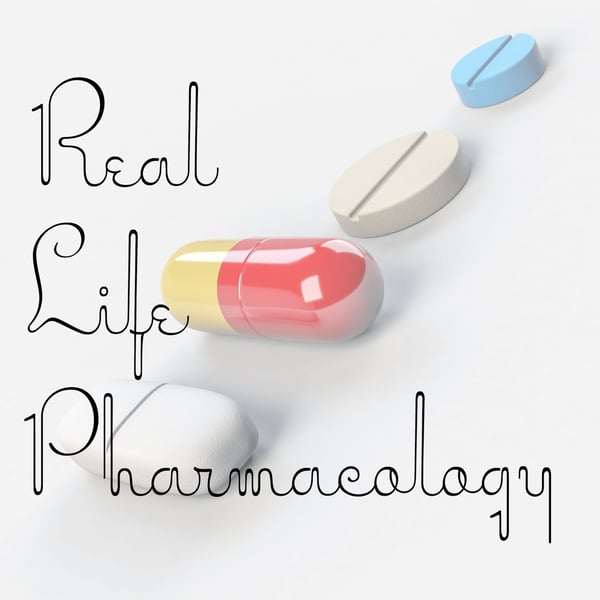Propylthiouracil Pharmacology Podcast
Real Life Pharmacology - Pharmacology Education for Health Care Professionals
Eric Christianson, PharmD; Pharmacology Expert and Clinical Pharmacist
5 • 716 Ratings
🗓️ 15 December 2022
⏱️ 12 minutes
🧾️ Download transcript
Summary
Propylthiouracil carries a boxed warning for hepatotoxicity which is a significant downside compared to the other agent in its class (methimazole).
What about dosing? I discuss why this medication has to be dosed multiple times per day.
Drug interactions aren't incredibly common with propylthiouracil but it can affect warfarin differently than most drug interactions. I discuss it further in this episode.
Transcript
Click on a timestamp to play from that location
| 0:00.0 | Hey all, welcome back to the Real Life Pharmacology podcast. I'm your host, pharmacist, Eric Christensen. |
| 0:06.1 | As always, go check out Real Life Pharmacology.com. We've got the free Top 200 study guide. |
| 0:14.3 | Great no-brainer to have if you're in pharmacology classes, taking board exams, or if you're just looking for a refresher. |
| 0:21.3 | So again, real-life pharmacology.com will have that. |
| 0:25.2 | Simply an email will get you access. |
| 0:27.6 | All right, the drug of the day today is propyl thio-eurosome. |
| 0:33.3 | Now, most of you, if you've heard of this drug, have probably heard it referred by its name PtU, |
| 0:40.9 | or the abbreviation PtU. |
| 0:43.5 | Brand names of this medication, halosil, and thyracill or two that I've heard. |
| 0:50.1 | But overwhelmingly, I've heard folks call it PtU. |
| 0:54.2 | So that's probably what you'll hear in your pharmacology classes |
| 0:58.2 | and or clinical practice depending upon where you're at. |
| 1:02.8 | So this medication is an antithyroid agent. |
| 1:07.3 | So, you know, in a broad scheme of things, think the opposite of levo thyroxin, |
| 1:13.9 | which is basically supplementing or adding thyroid hormone. So as you could expect, |
| 1:20.4 | if it's an antithyroid agent, it's going to be used to manage hyperthyroidism. Graves disease |
| 1:26.4 | being kind of a classic example here. Now keep in mind there |
| 1:31.2 | are other medical procedures and things we do to manage hyperthyroidism. So medication therapy |
| 1:37.2 | like propylophtyotio or so may not be used in that situation. However, it is an option if patients are unable to do the other procedures, |
| 1:46.6 | that type of thing, which I'm not going to go into too much detail here. I want to focus on the drug, |
| 1:51.6 | but keep in mind that that is certainly an option as well, depending upon the diagnosis and the |
| 1:59.0 | situation that we're in. |
... |
Please login to see the full transcript.
Disclaimer: The podcast and artwork embedded on this page are from Eric Christianson, PharmD; Pharmacology Expert and Clinical Pharmacist, and are the property of its owner and not affiliated with or endorsed by Tapesearch.
Generated transcripts are the property of Eric Christianson, PharmD; Pharmacology Expert and Clinical Pharmacist and are distributed freely under the Fair Use doctrine. Transcripts generated by Tapesearch are not guaranteed to be accurate.
Copyright © Tapesearch 2025.

